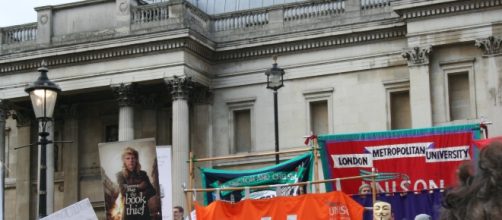On Guy Fawkes Day, the 5th of November - a day of historical precedence for challenging the government - public service unions joined leading authors, librarians and gallery staff to demonstrate against closures and privatisation of libraries, galleries and museums. The march - which began at the British Museum and ended in a rally at Trafalgar Square - was co-organised by the umbrella campaign Show Culture Some Love to make a plea against the continued erosion of cultural services.
One of the most devastating consequences of austerity policies are the cutbacks local authorities have had to face for their provision of public services.
The most vital of what by councils are categorised as 'non-essential' services, public libraries, have faced the worst cuts in the form of closures, reduction of size, reduced staff hours, and reduction of stock.
Local protests for libraries
All over the UK, communities have been petitioning, protesting and fighting legal battles against their local authorities to maintain their library service. More than 340 libraries have been closed since 2010 and staff reduced by 25%. In Lambeth, the community challenged plans to convert three of their libraries into gyms. On the day of closure of the historic Carnegie library, it was occupied in a high profile action which has forced the council to negotiate.
In Barnet, residents staged demonstrations in opposition to the council's intention to convert many of their libraries to an electronic, unstaffed system.
This system has been criticised for failing to provide adequate oversight, reducing what is meant to be a community space into an impersonal, computerised arrangement - what campaigners are calling 'zombie' libraries. In several UK boroughs, library users have attempted legal action and, in February 2016, the Speak Up For Libraries coalition held a mass lobby of MPs at Parliament (#SUFLobby16). This followed a more centralised campaign by CILIP (Chartered Institute of Library and Information Professionals), which criticised government cuts to libraries on a statutory basis: by statute, local authorities must provide a 'comprehensive and efficient' library service (#MyLibraryByRight).
Libraries serve as a lifeline
Public libraries are a lifeline for the community, providing not only books and access to information, but a space where people can seek advice and guidance to services, learn skills, seek refuge and meet as community groups. Many low-income families rely on libraries for their children's literacy requirements. One librarian tweets: "Closures of libraries is CENSORSHIP for thousands of communities across Britain."
A library user testifies: "there wasn't a library...they said 'well you can go into town'...I'd come here because I was disabled." Lord John Bird, founder of the Big Issue, who spoke passionately at the Guy Fawkes Day demonstration, has appealed: "Let us unite, protect our libraries and save our communities', emphasising that if we cut our cultural services, we will increase social reliance on our prisons and mental health services.
The three thousand protesters who marched on November 5th have sent a clear message to the government: their legitimacy is dependent on continued quality public access to culture and information.

